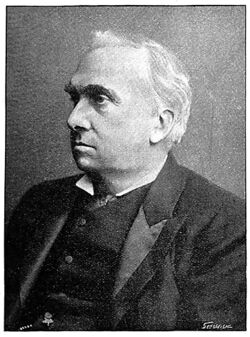Edmond Savary d'Odiardi
From Kook Science
| Edmond Savary d'Odiardi | |
|---|---|
 Photo portrait, c. 1898 | |
| Born | 18 November 1835 Torcy, Sedan, Ardennes, Kingdom of France |
| Died | 3 February 1904 (68) St. George Hanover Square, London, England, United Kingdom |
| Workplace(s) | Notting Hill Gate Hospital (a.k.a. Electro-Pneumatic Hospital) |
François Edmond Savary d'Odiardi (November 18, 1835 - February 3, 1904) was a French composer and medical electrician who devised a Thought Machine, sometimes referred to as a Register of Cerebral Forces, that he asserted measured and recorded otherwise unseen mental forces at a distance.
Selected Bibliography
- d'Odiardi, E. S. (1893), Medical Electricity: What Is It? And How Does it Cure?, London: Sonnenschein, https://catalog.hathitrust.org/Record/012291097
Press Coverage
- "D'Odiardi's Medical Electricity", Electrical Engineer 15 (247): 102, 25 Jan. 1893
WE have recently received from England a little pamphlet purporting to give a description of the electro-medical apparatus, etc., used by Professor D'Odiardi, of West Mall, Notting Hill Gate, and Cornwall Gardens, London, S.W. It is evident that in some branches of "medical" electricity, England is far ahead of America. We note that the pamphlet quotes Mr. Edison as saying that these instruments are "more effective and perfect than the apparatus hitherto employed;" and as admitting that he had only aided the distinguished professor "in a very modest way."
We cannot mention all the apparatus, but think that some of it will interest our readers, such, for example, as the lung healer in which "the vapor of extractum exoticum is loaded with static electricity at high tension." Another amusing piece is the "electro-injector" which "can be employed with static or galvanic electricity. The current passes through a continuous liquid jet or is carried by separate drops according to the effects required. It cannot be replaced by any known instrument." But even this is a trifle compared with the "gaseous-high-electric tension current" (£50 which is "an apparatus for the simultaneous employment of magnetic lines of force, of static electricity and of voltaic and faradic currents on the bare body, immersed in various gases loaded with static electricity." But perhaps a patient might prefer the half-guinea diamagnetiser which is "employed with static electricity for softening of the brain" and other like diseases to which Professor D'Odiardi's clientèle seem peculiarly liable. The masterpiece of all is the "electro-spiral hood" (£500). This is as wonderful as it is costly. "The patient is kept alive in this apparatus until strength has been restored by nutrition. The wire of the coil is more than 300 miles long. The wind of the coil is 200,000." It appears that this will even make a dead man sit up and take his gruel, while an ordinarily valetudinarian is soon rendered fit for a bout with Corbett.
And then there is the "deep plunge electrode" (2½ guineas) by means of which "the voltaic current is directed at will and may be made to plunge at any depth and in any direction without scattering or radiating." Or the "sleep-promoter," which "acts by itself," not only inviting to grateful slumber but regulating the bowels. This, like the "healing cup," (10 guineas, for private use only) is said to be a good substitute for chloroform, and rivals in benefit to mankind the 40 guinea "electro-inhaling cabinet," which is simply indispensable when the victim can afford to pay for it. Prof. D'Odiardi really ought to apply for space in the Electricity Building at the World's Fair.
- Maude, Athol (1902), "The New Elixir of Life", Pearson's Magazine 13: 328-331, https://www.google.com/books/edition/Pearson_s_Magazine/IqHQAAAAMAAJ?hl=en&gbpv=1&pg=PA328
Notes
- d'Odiardi inherited an Italian ducal title of Napoleonic origin, becoming the Duc de Rovigo, sometimes thereafter being referred to as Edmond Savary d'Odiardi de Rovigo.
Reading
- Pellerin, Denis (24 Nov. 2021), A Second Lease of Life - Sitters and Photographers: Part One: Mrs Alfred de Beauchesne (sitter) and Savary (photographer), theclassicphotomag.com, https://theclassicphotomag.com/a-second-lease-of-life/ — notes on Savary d'Odiardi's familial background